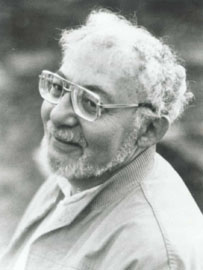
Stanley Lawrence Elkin was an American novelist, short story writer, and essayist. His extravagant, satirical fiction revolves around American consumerism, popular culture, and male-female relationships.
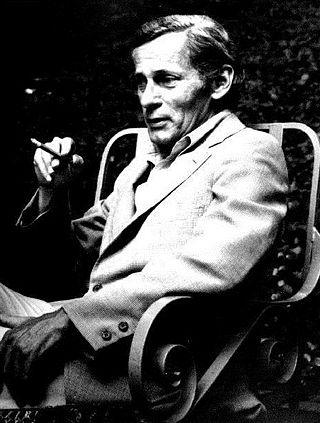
William Thomas Gaddis Jr. was an American novelist. The first and longest of his five novels, The Recognitions, was named one of TIME magazine's 100 best novels from 1923 to 2005 and two others, J R and A Frolic of His Own, won the annual U.S. National Book Award for Fiction. A collection of his essays was published posthumously as The Rush for Second Place (2002). The Letters of William Gaddis was published by Dalkey Archive Press in February 2013.

John Robert Fowles was an English novelist of international renown, critically positioned between modernism and postmodernism. His work was influenced by Jean-Paul Sartre and Albert Camus, among others.

Brian O'Nolan, his pen name being Flann O'Brien, was an Irish civil service official, novelist, playwright and satirist, who is now considered a major figure in twentieth-century Irish literature. Born in Strabane, County Tyrone, he is regarded as a key figure in modernist and postmodern literature. His English language novels, such as At Swim-Two-Birds and The Third Policeman, were written under the O'Brien pen name. His many satirical columns in The Irish Times and an Irish-language novel, An Béal Bocht, were written under the name Myles na gCopaleen.

William Howard Gass was an American novelist, short story writer, essayist, critic, and philosophy professor. He wrote three novels, three collections of short stories, a collection of novellas, and seven volumes of essays, three of which won National Book Critics Circle Award prizes and one of which, A Temple of Texts (2006), won the Truman Capote Award for Literary Criticism. His 1995 novel The Tunnel received the American Book Award. His 2013 novel Middle C won the 2015 William Dean Howells Medal.

Aidan Higgins was an Irish writer. He wrote short stories, travel pieces, radio drama and novels. Among his published works are Langrishe, Go Down (1966), Balcony of Europe (1972) and the biographical Dog Days (1998). His writing is characterised by non-conventional foreign settings and a stream of consciousness narrative mode. Most of his early fiction is autobiographical – "like slug trails, all the fiction happened."
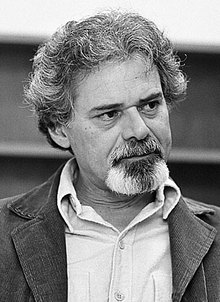
Gilbert Sorrentino was an American novelist, short story writer, poet, literary critic, professor, and editor.
Dalkey Archive Press is an American publisher of fiction, poetry, foreign translations and literary criticism specializing in the publication or republication of lesser-known, often avant-garde works. The company has offices in Funks Grove, Illinois, in Dublin, and in London. The publisher is named for the novel The Dalkey Archive, by the Irish author Flann O'Brien. It is owned by nonprofit publisher Deep Vellum.

Harry Mathews was an American writer, the author of various novels, volumes of poetry and short fiction, and essays. Mathews was also a translator of the French language.
Joseph Prince McElroy is an American novelist, short story writer, and essayist. He is noted for his long postmodern novels such as Women and Men.
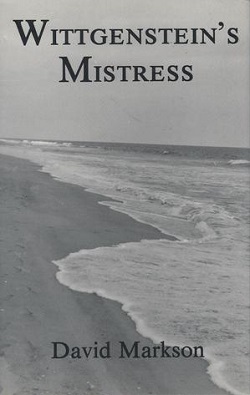
Wittgenstein's Mistress by David Markson is a highly stylized, experimental novel in the tradition of Samuel Beckett. The novel is mainly a series of statements made in the first person; the protagonist is a woman named Kate who believes herself to be the last human on earth. Though her statements shift quickly from topic to topic, the topics often recur, and often refer to Western cultural icons, ranging from Zeno to Beethoven to Willem de Kooning. Readers familiar with Ludwig Wittgenstein's Tractatus Logico-Philosophicus will recognize stylistic similarities to that work.
Craig Nova is an American novelist and author of fourteen novels.
Michael Silverblatt, a literary critic and American broadcaster who hosted Bookworm, a nationally syndicated radio program focusing on books and literature, from 1989 to 2022. He recorded over 1600 interviews with authors and other literary figures, including David Foster Wallace, Salman Rushdie, William Gass, W.G. Sebald, and John Ashbery.

Christopher Sorrentino is an American novelist and short story writer of Italian and Puerto Rican descent. He is the son of novelist Gilbert Sorrentino and Victoria Ortiz. His first published novel, Sound on Sound (1995), draws upon innovations pioneered in the work of his father, but also contains echoes of many other modernist and postmodernist writers. The book is structured according to the format of a multitrack recording session, with corresponding section titles.

Mulligan Stew is a postmodern novel by Gilbert Sorrentino. It was first published in 1979 by Grove Press, simultaneously in hardcover and softcover.

James McCourt is a gay American-born writer and novelist who was raised in Jackson Heights, Queens. McCourt has been with his life partner, novelist Vincent Virga, since 1964 after they met at Yale University as graduate students in the Yale School of Drama. McCourt's and Virga's papers are held at Yale's Beinecke Rare Book & Manuscript Library.
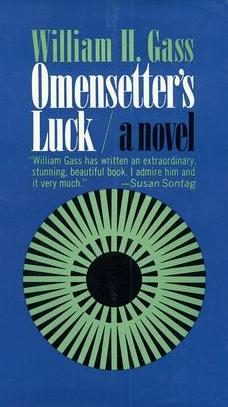
Omensetter's Luck is the first novel by William H. Gass, published in 1966.
Steven Moore is an American author and literary critic. Best known as the primary authority on the novelist William Gaddis, he is the author of the two-volume study The Novel: An Alternative History.

The Making of Americans: Being a History of a Family's Progress is a modernist novel by Gertrude Stein. The novel traces the genealogy, history, and psychological development of members of the fictional Hersland and Dehning families. Stein also includes frequent metafictional meditations on the process of writing the text that periodically overtake the main narrative.

Middle C is a 2013 novel by William H. Gass. Gass started writing it sometime after 1998, with a first excerpt appearing in 2001.















